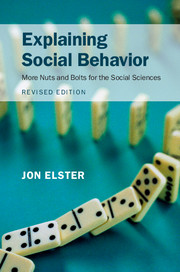Book contents
- Frontmatter
- Dedication
- Contents
- Preface
- I Explanation and Mechanisms
- II The Mind
- III Action
- 10 Constraints: opportunities and abilities
- 11 Reinforcement and selection
- 12 Persons and situations
- 13 Rational choice
- 14 Rationality and behavior
- 15 Responding to irrationality
- 16 Implications for textual interpretation
- IV Interaction
- Conclusion: is social science possible?
- Index
10 - Constraints: opportunities and abilities
from III - Action
Published online by Cambridge University Press: 05 August 2015
- Frontmatter
- Dedication
- Contents
- Preface
- I Explanation and Mechanisms
- II The Mind
- III Action
- 10 Constraints: opportunities and abilities
- 11 Reinforcement and selection
- 12 Persons and situations
- 13 Rational choice
- 14 Rationality and behavior
- 15 Responding to irrationality
- 16 Implications for textual interpretation
- IV Interaction
- Conclusion: is social science possible?
- Index
Summary
To characterize and explain behavior, we sometimes say, “He did the best he could.” Here, “the best” is defined by the agent's desires or preferences. What the agent “could do” is defined by his opportunities and his abilities. An opportunity, according to the Oxford English Dictionary, is “a time, condition, or set of circumstances permitting or favorable to a particular action or purpose.” An ability is the “quality in a person or thing which makes an action possible; suitable or sufficient power or proficiency.” While not unambiguous, the definitions suggest that an opportunity is an enabling factor external to the agent, whereas an ability is an enabling factor internal to him or her.
Typically, an agent needs both opportunities and abilities to realize her desires. If I have a horse and need to get somewhere in hurry, but do not know how to ride, I am likely be thrown off. If I have the skill and the desire, but lack a horse, I will not be going anywhere. (“A horse, a horse, my kingdom for a horse!”) A basketball player will not score if others do not provide him with an opportunity, by passing the ball to him, or if he is too unskilled to profit from his opportunities.
In military parlance, the idea of capabilities usually includes both opportunities and abilities, typically related to action in a multiplicative rather than additive fashion. A commander has to estimate both the weaponry available to the enemy and the skill to use it. Advanced materiel in the hands of soldiers not trained to use it may be worthless. Some philosophers argue that capabilities – defined as “a person's opportunity and ability to generate valuable outcomes” (Wikipedia) – should be the central concept in a theory of distributive justice. For some purposes, capabilities may indeed be the most relevant factor. For my purposes, I want to consider the two components of capabilities separately.
In most of the cases I shall discuss, desires, opportunities, and abilities are jointly sufficient and individually necessary to produce an action. If we observe that an agent does not perform some action and we want to know why (see Chapter 1 on “why-explanations” of non-events), the absence of any one of the three factors might provide the answer. Citing the absence of more than one factor would provide an overdetermined explanation.
- Type
- Chapter
- Information
- Explaining Social BehaviorMore Nuts and Bolts for the Social Sciences, pp. 189 - 204Publisher: Cambridge University PressPrint publication year: 2015



